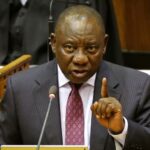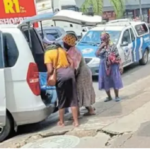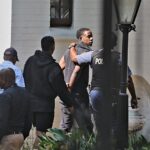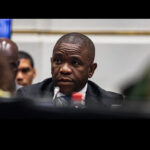In the shadowy underbelly of South Africa's celebrity world and high-stakes business dealings, a chilling pattern has emerged involving firearms tied to a string of attacks on well-known figures. Authorities have connected weapons seized in recent arrests to the 2022 killing of popular musician Oupa John Sefoka, better known as DJ Sumbody, and to nearly a dozen other incidents targeting celebrities. This web of crime has drawn in accused individuals with links to organised syndicates, political interference, and even mistaken-identity tragedies, painting a picture of a network that reaches into the heart of law enforcement and tender processes. Adding to the intrigue, Patriotic Alliance deputy president Kenny Kunene found himself caught up in the drama during a raid at the home of one key suspect, while former Hawks head Godfrey Lebeya has stepped forward to clarify his role in a related arrest attempt. These revelations unfold against a backdrop of court battles, whistleblower alerts, and claims of systemic capture, offering a deeper look into how personal ambitions and criminal enterprises intersect in unexpected ways.
The story begins with the tragic end of DJ Sumbody, whose life was cut short in a targeted ambush on 20 November 2022 in Woodmead, north of JOHANNESBURG. Early that Sunday morning, his GTI vehicle became the focus of a drive-by assault, riddled with 48 bullets that left him dead along with his driver, Sibusiso Mokoena, and his bodyguard, Sandile Myeza. The scene was one of chaos, with the car bearing the marks of a planned execution that claimed three lives and left investigators piecing together motives that have remained elusive for years. Police have kept details close to their chests, avoiding public disclosure on what might have driven the attack, but the recent breakthroughs suggest ties to broader criminal activities that extend far beyond this single event.
Fast forward to the arrests that have reignited interest in the case. On a Monday in Gauteng, four men aged between 45 and 60 were taken into custody, facing charges related to the murders of DJ Sumbody and his two companions. Among them stands Sandton businessman Katiso KT Molefe, accused of orchestrating the hit, alongside former police detective Michael Pule Tau, Tlego Floyd Mabusela—also known as Tiego—and Musa Kekana, who are believed to have carried out the act as hitmen. These individuals appeared before the Alexandra Magistrate's Court on the following Tuesday, charged with three counts of murder, conspiracy to commit murder, and possession of unlicensed firearms. The courtroom proceedings were brief but tense, with the state requesting a delay until 29 July to prepare for a bail hearing, citing new information that required further scrutiny.
Molefe's legal team, led by advocate Annelene van den Heever, pushed back, expressing readiness to proceed immediately, but the court ultimately granted the postponement to allow the prosecution time to finalise investigations, including detailed profiling of the accused.
What makes this case particularly gripping is the ballistic evidence that has surfaced. During the arrests, police confiscated an AK47 and three pistols, which forensic tests have now linked not only to DJ Sumbody's murder but also to at least 10 other high-profile matters involving celebrities. These connections encompass both completed murders and attempts, though authorities have chosen not to reveal specifics at this stage, heightening the mystery and speculation around which famous names might be involved. Police spokesperson Brigadier Athlenda Mathe highlighted this outside the court, noting how the weapons tie into a larger pattern of targeted incidents that have plagued the entertainment and public figure scene. This discovery underscores the scale of the operation, suggesting a coordinated effort that has affected multiple lives over time.
Molefe's name carries additional weight due to his alleged role in other serious offences. He is central to claims made by KwaZulu-Natal police commissioner Lieutenant General Nhlanhla Mkhwanazi during a press conference on 6 July, where he outlined how criminals had infiltrated the nation's law enforcement structures. Mkhwanazi pointed to Molefe as a figure whose activities prompted the disbandment of the Political Killings Task Team, a unit established to probe politically motivated crimes in the province. This shutdown reportedly occurred in December following Molefe's arrest for another killing—that of Vaal engineer Armand Swart in 2024. Swart's death is believed to have stemmed from a case of mistaken identity, linked to a whistleblower at his engineering firm who had raised alarms about price inflation in a Transnet tender for manufacturing springs. The task team's involvement in Molefe's apprehension for that incident allegedly led to its dissolution, raising questions about external pressures influencing police operations.
At the time of his arrest for DJ Sumbody's murder, Molefe was already out on R100,000 bail for the Swart case. He had initially been denied bail by the Vereeniging Regional Court, but that decision was later overturned, allowing him temporary freedom. In contrast, his co-accused in the DJ Sumbody matter—Tau, Mabusela, and Kekana—were already in custody awaiting trial for related charges, and their representatives indicated no intention to apply for bail during the initial court appearance. This disparity highlights the varying legal paths of those involved, with Molefe's business background perhaps affording him certain advantages in the judicial process.
The connections don't stop there. Mabusela and Kekana are also implicated in a separate high-profile case alongside businessman Vusimuzi Cat Matlala and his wife, Tsakani Matlala, concerning the attempted murder of Matlala's former partner, socialite Tebogo Thobejane. This incident adds another layer to the narrative, as Thobejane, known for her work as an actress on the series Muvhango, survived an attack that has drawn significant media attention. On the same Tuesday as the DJ Sumbody court appearance, a fifth person, Nthabiseng Nzama—daughter of one of the other accused—was added to the charge sheet in this matter. Nzama faces accusations of money laundering amounting to R120,000 tied to the event and was granted bail that day. The Matlala case intertwines with broader allegations of improper dealings, including Matlala's controversial R360-million tender with the police for health services, which was eventually cancelled amid suspicions of irregularities.
Matlala's business practices have long been under scrutiny, particularly after Gauteng health whistleblower Babita Deokaran flagged suspicious transactions involving him and Tembisa Hospital prior to her own untimely death. Despite these red flags, Matlala secured the lucrative police contract, only for it to be revoked later. His name, like Molefe's, featured prominently in Mkhwanazi's revelations about the capture of law enforcement by criminal elements, including the shutdown of investigative units to protect key players. This pattern suggests a sophisticated network where tenders, personal relationships, and criminal acts converge, potentially shielding those at the top while endangering whistleblowers and innocents alike.
Amid the arrests for DJ Sumbody's murder, an unexpected figure entered the fray: Kenny Kunene, deputy president of the Patriotic Alliance and member of the mayoral committee (MMC) for transport in JOHANNESBURG. Kunene was present at Molefe's property when police raided it on that Monday, leading to Molefe's apprehension. Kunene has firmly denied any prior association with Molefe, describing the situation as a matter of being in the wrong place at the wrong time for entirely legitimate reasons. As the owner of the online publication African News Global, Kunene explained that he had arranged to facilitate an exclusive interview with Molefe through mutual contacts. Molefe, facing public scrutiny over his legal troubles, had agreed to share his perspective on various issues, and Kunene was there to accompany one of his journalists to ensure the meeting proceeded smoothly.
According to Kunene, he had spoken to acquaintances who knew Molefe, setting up the encounter. He insisted that he had never met Molefe personally before, except for a brief greeting at a birthday party for the mother of the intermediary who organised the interview.
At that event, they exchanged pleasantries but remained in separate groups, with no exchange of contact details or further communication. Kunene recounted arriving at the property, greeting the connector, and then witnessing police force their way through the gate before he could even enter the house. When questioned by officers about his relationship with Molefe, Kunene stated that he knew him only from afar and offered to prove it by showing his phone. He did not have Molefe's number stored, and he demonstrated this by allowing police to check. Furthermore, he displayed messages from the intermediary, which included directions to the location—first a road name, then a specific address—arguing that such instructions would not be necessary if he had visited before.
Kunene urged the police to investigate thoroughly to confirm his account, emphasising that his presence was purely professional and unrelated to any criminal activities. This incident has sparked political fallout, with the Democratic Alliance's JOHANNESBURG caucus leader, Belinda Kayser-Echeozonjoku, declaring Kunene's position as MMC for transport unsustainable. She called for his immediate resignation, suggesting that if he did not step down, Mayor Dada Morero should remove him from the role. Kayser-Echeozonjoku dismissed Kunene's explanation about accompanying a journalist as unconvincing, arguing that his presence at the home of a murder suspect raised serious questions about his judgement and fitness for public office.
The human side of this sprawling saga comes through in the reactions from DJ Sumbody's family, who have expressed relief at the progress in the investigation. Through their representative, Chad Thomas, they conveyed appreciation for the dedication of police officers who have worked tirelessly since 2022 to bring those responsible to account. Thomas spoke outside the Alexandra Magistrate's Court on the day of the accused's first appearance, noting how heartening it was to see arrests finally made after such a prolonged period. The family hopes for justice not only in this case but in others as well, extending beyond high-profile matters to everyday incidents that affect ordinary people. However, Thomas raised concerns about the safety of the investigating officers, pointing out that they arrived at court under heavy security due to risks they faced from probing such a prominent and dangerous network. This element adds a layer of peril to the story, illustrating the personal costs borne by those on the front lines of law enforcement in their pursuit of truth and accountability. The family views these developments as a step toward closure, acknowledging the emotional toll of the drawn-out process while praising the commitment shown by the police team.
Complicating the narrative further are allegations surrounding former Hawks head Godfrey Lebeya, who has addressed claims of interference in Molefe's earlier arrest for the Swart murder. These accusations stemmed from Mkhwanazi's statements, which suggested that Molefe contacted Lebeya during an attempt by the Political Killings Task Team to apprehend him in April of the previous year. According to the claims, Lebeya then sent a Hawks team to Molefe's home to halt the process. Lebeya has categorically denied any direct involvement or personal acquaintance with Molefe, stating that he never met the businessman and that Molefe does not know him. Instead, Lebeya explained that he received a call from someone believed to be a friend of Molefe's, inquiring whether the officers at the scene were genuinely from the Hawks, as they had claimed.
Upon verifying that no official Hawks unit had been dispatched for the arrest, Lebeya instructed a team to investigate the situation on site. He emphasised that this action was not meant to disrupt legitimate police work but to confirm the authenticity of the officers present and ensure they were conducting lawful activities. Lebeya defended the Hawks' response as appropriate, given the complaint about potential impersonation, which could undermine trust in law enforcement if left unchecked. This clarification sheds light on the internal dynamics within policing agencies, where overlapping jurisdictions and suspicions can lead to tense standoffs, even among those meant to collaborate against crime.
As these threads weave together, they reveal a multifaceted tale of ambition, betrayal, and the quest for justice in a country where celebrity status offers no shield from danger. The firearms linking DJ Sumbody's fate to 10 other celebrity attacks point to a calculated operation that has operated in the shadows for years, targeting individuals across the entertainment and business sectors. Molefe's central role, from alleged masterminding to his entanglements in tender scandals and task team disruptions, positions him as a linchpin in this drama.
The Matlala connection extends the reach, bringing in elements of money laundering, failed tenders, and whistleblower perils, as seen with Deokaran's warnings about hospital dealings that went unheeded until too late. The involvement of a police detective like Tau raises alarms about insider knowledge being used for illicit purposes, while Mabusela and Kekana's multiple charges suggest repeat offenders who have evaded capture until now. Matlala's cancelled tender, flagged by Deokaran, ties into a pattern of public funds being diverted, with her warnings serving as an early signal ignored at great cost.

Follow Us on Twitter











